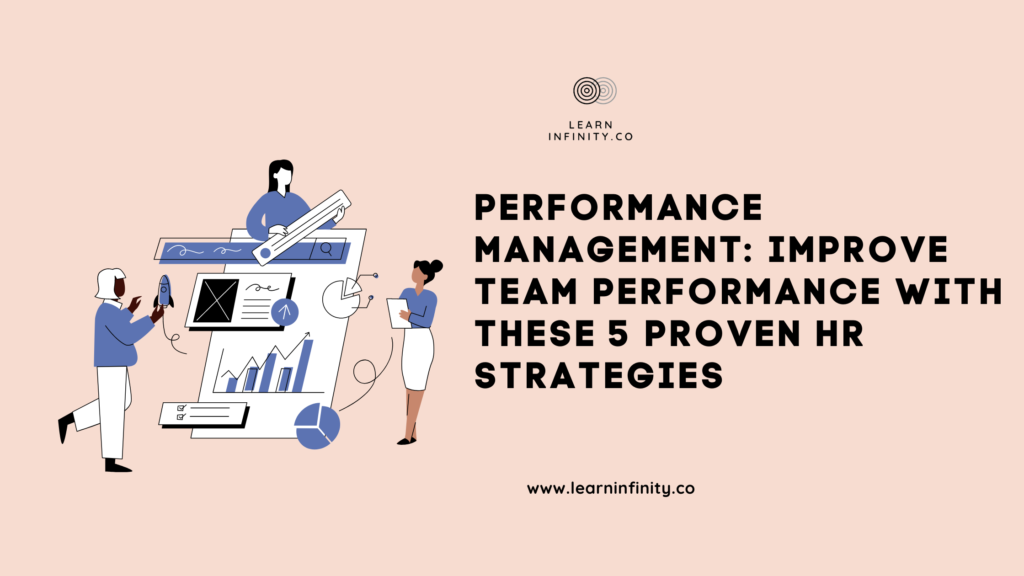Research indicates that organizations with engaged employees and customers tend to see a 240% increase in performance-related business outcomes compared to those without engaged employees or customers.
Performance Management is an essential component of any business since it makes sure that everyone on the team is striving to achieve the company’s objectives and that everyone is meeting or exceeding expectations. However, controlling performance can be a difficult undertaking, particularly for HR specialists who are in charge of supervising the procedure. In this blog post, we’ll go over five tried-and-true methods HR may use to boost team productivity through efficient performance appraisal.
What is Performance Management?
Performance Management is the process of assessing and enhancing an organization’s employee performance. Setting performance goals and targets, monitoring and evaluating employee performance on a regular basis, giving feedback and coaching, and putting improvement plans into action is all part of it. Performance Management aims to make sure that staff members are meeting or exceeding expectations and that the team is contributing to the accomplishment of the organization’s objectives.
It is like being a personal trainer for your employees! It’s all about setting goals, checking in on progress, giving feedback, and helping them improve their skills so they can perform at their best and help your company achieve its goals. Think of it as a workout plan for your team, keeping them fit and strong so they can tackle any challenge that comes their way.
Why is Performance Management important?
Performance Management is crucial for a business because it enables data-driven decision-making on staffing and development, measures and tracks progress toward organizational goals, and identifies opportunities for improvement. Additionally, it promotes greater employee involvement, productivity, and job satisfaction.
Performance Management is like being a superhero for your company! It helps you keep track of who’s doing what and how well they’re doing it, so you can make sure everyone’s working together to save the day (or achieve the company’s goals). Plus, it helps you identify and train up-and-coming heroes (employees) so they can take on bigger and better roles in the future. Who doesn’t love a good superhero story?
How can you achieve effective Performance Management?
Let’s learn some tips and tricks for effective Performance Management:

Clearly Define Expectations:
The ability to accurately communicate expectations to staff members is one of Performance Management’s most critical components. This entails establishing quantifiable goals and objectives, describing the precise duties of each function, and regularly offering feedback on success.
HR may guarantee that employees are working toward the same objectives as the rest of the organization by clearly establishing expectations and helping employees understand what is expected of them.
Regularly Monitor Performance:
The ability to accurately communicate expectations to staff members is one of Performance Management’s most critical components. This entails establishing quantifiable goals and objectives, describing the precise duties of each function, and regularly offering feedback on success.
HR may guarantee that employees are working toward the same objectives as the rest of the organization by clearly establishing expectations and helping employees understand what is expected of them.
Provide Ongoing Training and Development:

Giving staff regular opportunities for training and development is another way for HR to boost team performance. This can range from formal training courses to possibilities for on-the-job training. HR may assist staff members in developing their knowledge and abilities while keeping them current on the most recent market trends and best practices by offering continuous training and development opportunities.
Create a Positive Work Environment:
Employee performance can be significantly impacted by the workplace. By fostering an atmosphere that is supportive of productivity, creativity, and employee wellbeing, HR can enhance team performance. This can involve things like encouraging a good work-life balance, giving employees chances to be recognized and engaged, and developing a climate of open communication and trust.
According to Willis Towers Watson 2021 Employee Experience Survey, 92% of employers say improving employee experience will be a key priority for their organization over the next three years.
Reward and Recognize High Performers:
Last but not least, rewarding and recognizing top performers is one of HR’s most successful methods for enhancing team performance. Things like bonuses, promotions, and other incentives may fall under this category. HR may inspire others to aim for comparable levels of accomplishment and foster a culture of high performance within the company by recognizing and rewarding employees who consistently meet or exceed objectives.
In conclusion, effective Performance Management is essential for any organization looking to improve team performance and achieve its goals. By implementing these 5 proven HR strategies, you can create a Performance Management system that aligns employee goals with the overall goals of the organization, measures, and tracks progress, identifies areas for improvement, and makes data-driven decisions about staffing and development.
With a well-designed Performance Management system in place, you can create a culture of accountability and engagement, boost employee productivity and satisfaction, and ultimately drive better business results.
Example of companies that uses Performance Management:

Google, which is renowned for its creative management style, has put in place a project devoted to assessing the performance of its managers to give them the necessary training and growth. Because of this, the Performance Management system has improved, enabling managers and workers to succeed. Their Objectives and Major Results (OKRs) approach is one of the key tactics they use.
The main outcomes are used to track progress and make data-driven decisions. This system reframes the goal-making process by creating explicit and measurable targets. Since it has been shown to be a successful method for enhancing performance and achieving organizational objectives, this strategy has been widely adopted by many other businesses and sectors.

Facebook is known for its emphasis on peer-to-peer feedback in its Performance Management process. The semi-annual reviews and internal software for continuous, real-time feedback allows them to identify areas of collaboration, as well as potential issues that can be addressed proactively. This helps to improve the performance of teams and the overall work culture.






